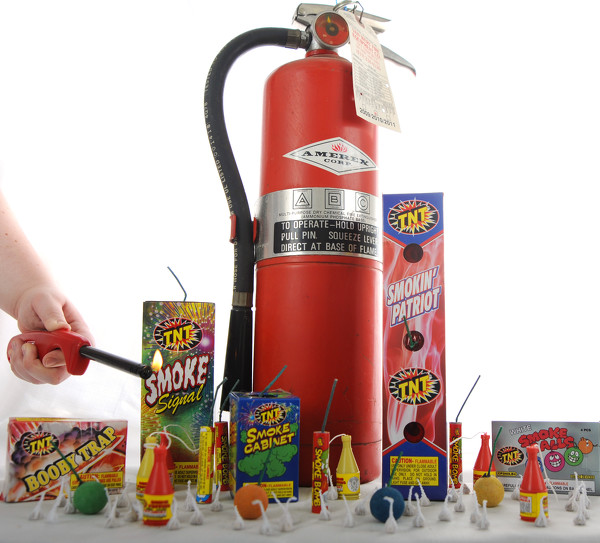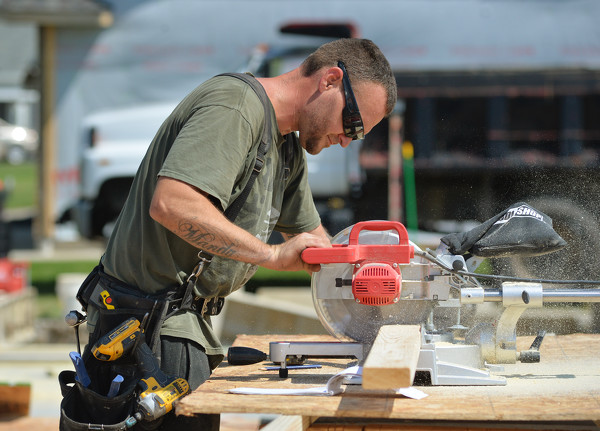Friday, July 5th, 2019
Celebrate safely
Experts urge caution around fireworks
By Leslie Gartrell

Photo by Dan Melograna/The Daily Standard
Celebrate safely: On average, 180 people go to the emergency room every day with fireworks-related injuries in the month around the July Fourth holiday, according to the U.S. Consumer Product Safety Commission.
CELINA - Two of the area's biggest fireworks shows are this weekend, but residents are reminded that they can cause anxiety and injuries in humans and pets - and they're illegal in Ohio unless the user has a state permit.
Unlicensed Ohioans can purchase consumer, or 1.4-gram, fireworks from a licensed wholesaler or manufacturer, but they cannot fire them off in the state, according to the State Fire Marshal.
All fireworks purchased in Ohio by unlicensed individuals must be transported out of state within 48 hours of purchase, according to state law. The only items that can be used in Ohio are "trick and novelty" fireworks, which smoke, pop and/or sparkle. Use of 1.4-gram fireworks such as firecrackers and bottle rockets is illegal.
While the law changed in 2015 allowing Ohioans to purchase fireworks without signing a consumer statement confirming they would take fireworks out of state - often referred to as the "Liar's Law" - the use of consumer fireworks is still prohibited.
Senate legislation was introduced in May to allow Ohio residents to discharge 1.4-gram consumer fireworks. However, the bill has received overwhelming opposition from organizations such as the Ohio State Medical Association, the Ohio Affiliate of Prevent Blindness and the Ohio Public Health Association.
Celina Police Chief Tom Wale said the department will occasionally get complaints of noise from fireworks on July 4 but not in overwhelming numbers. Unless the blasts involve reckless or dangerous behavior, residents are usually given a warning before serious action is taken. Wale said the exception would be large mortars or other large fireworks, in which case individuals may be arrested and their fireworks confiscated.
"We want everyone to have a safe and fun Fourth of July," he added.
Alcohol consumption may increase the chance of danger, Wale said, adding everything is better in moderation.
On average, 180 people go to the emergency room every day with fireworks-related injuries in the month around the July Fourth holiday, according to the U.S. Consumer Product Safety Commission. Fireworks were involved in an estimated 9,100 injuries nationwide in 2018, according to the CPSC. Of those, an estimated 5,600 fireworks-related injuries, or 62% of the total estimated fireworks-related injuries in 2018, occurred from June 22 to July 22.
More than 44% of the injuries were burns, the CPSC said. Hands and fingers were the most commonly injured body part at 28%, followed by legs at 24%. The CPSC also said sparklers burn at temperatures of about 2,000 degrees, which is hot enough to melt some metals.
Pets, especially dogs, can also be put at risk during the holiday. Bright lights and big booms can spook pets, causing them to destroy property or flee out of anxiety.
Dr. Ronald Anders of the County Animal Clinic, Coldwater, recommends pets be kept indoors during fireworks displays to keep them from running off. Pets should always have some form of identification - a collar or microchip, he said.
To help calm pets, Anders suggested adding lavender or chamomile oil on their bedding to help soothe their nerves. Dogs are den animals, Anders said, so people should crate-train their pups so they can have a spot to sleep, lie and relax. Owners can also put blankets over their crates to help create a calming atmosphere.
Anders said he would not recommend sedating pets because it treats only the symptoms and not the cause of the problem.
Fireworks displays can put people with post-traumatic stress disorder or anxiety on edge as well. Momentum Counseling and Consultation owner Michelle Salazar said loud noises can make people susceptible to anxiety.
People suffering from PTSD or anxiety may want to join in on the fun with loved ones, even if it causes discomfort, Salazar said. However, she recommends people be kind to themselves and practice good self-care. She also said loved ones should be respectful of their wishes and not judge.
"People can look perfectly normal and be devastated inside," she added.
To keep an emergency room visit from becoming a part of the holiday, the CPSC recommends people never point or throw fireworks at another person or place any part of their body directly over a fireworks device when lighting the fuse. Young children should never be allowed to play with or ignite fireworks, and adults should always supervise fireworks activities.
A bucket of water or a garden hose should be kept close by in case of fire or other mishap, and people should douse their fireworks with plenty of water after the device is done burning to prevent a trash or leaf fire.

